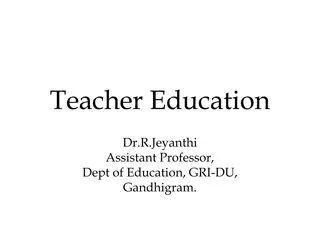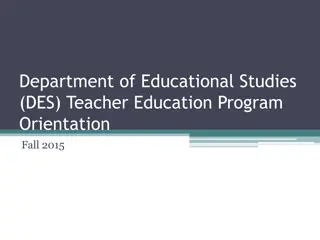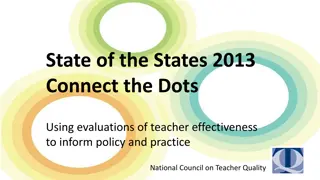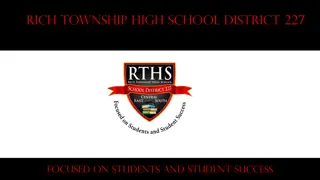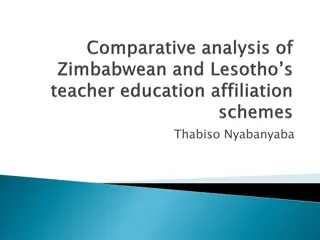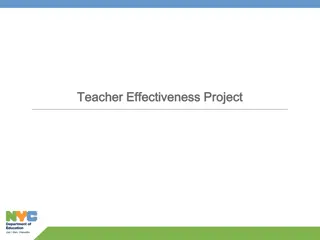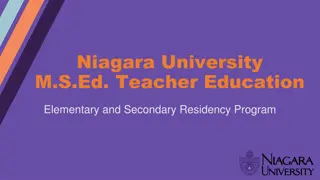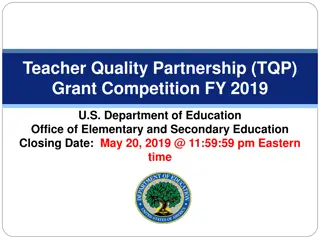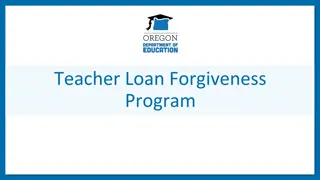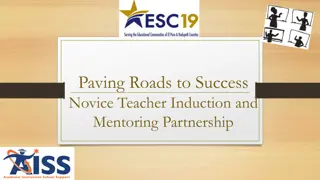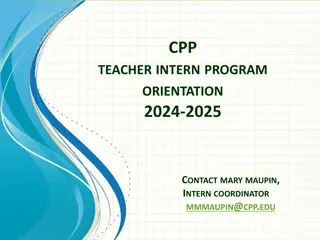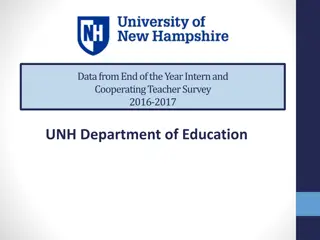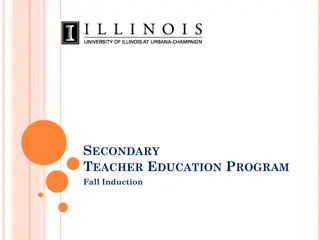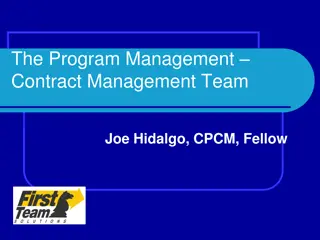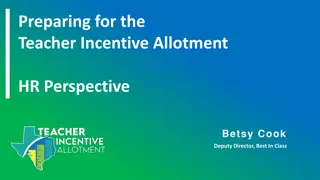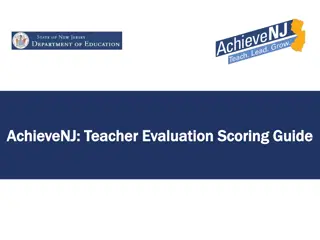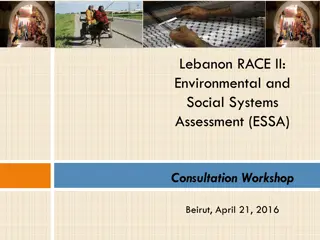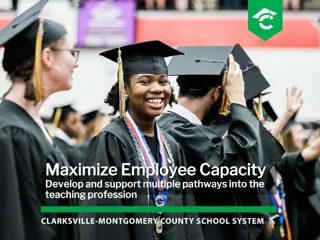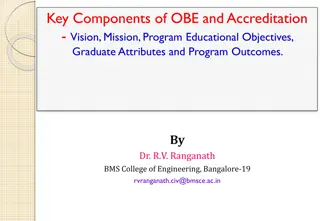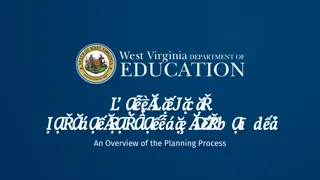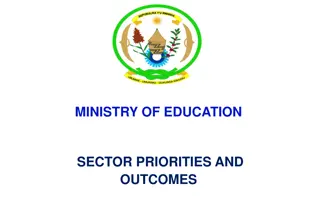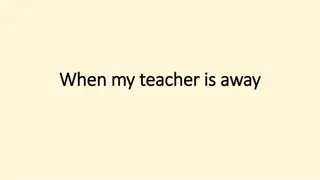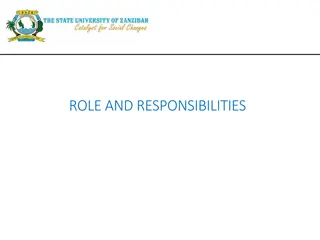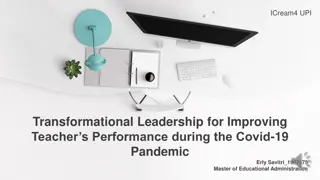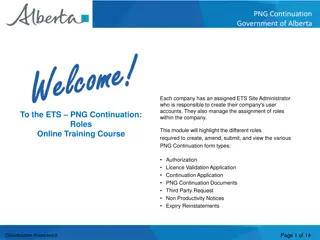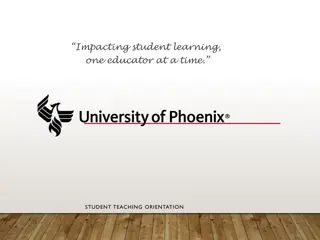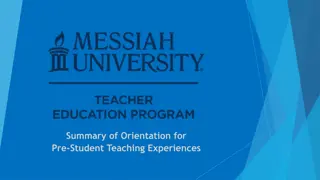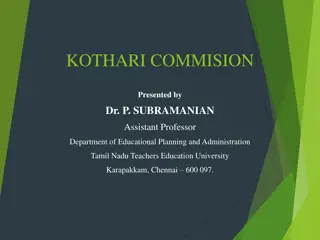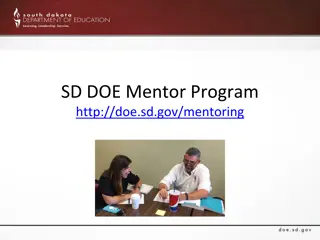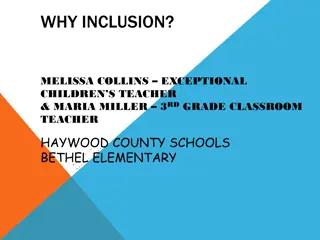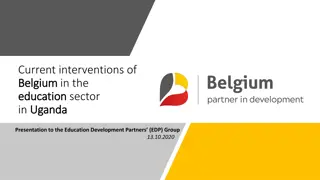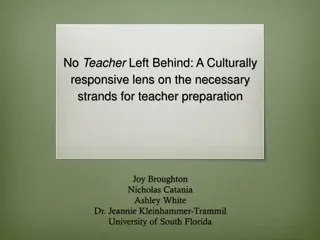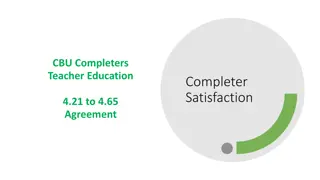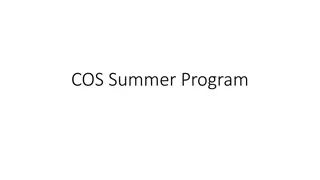Teacher Education Program Overview and Roles
In this teacher education program overview, gain insight into the roles and responsibilities of faculty, field experience coordinators, mentors, and interns. Explore the admission requirements, course schedule, and the practical experiences involved in the program. Understand the expectations from teacher candidates in terms of coursework completion, assessment, and professional development. Through mentorship and practical experiences, the program aims to equip future teachers with the necessary skills and knowledge for a successful teaching career.
Download Presentation

Please find below an Image/Link to download the presentation.
The content on the website is provided AS IS for your information and personal use only. It may not be sold, licensed, or shared on other websites without obtaining consent from the author. Download presentation by click this link. If you encounter any issues during the download, it is possible that the publisher has removed the file from their server.
E N D
Presentation Transcript
COME TO THE EDGE, HE SAID, THEY SAID: WE ARE AFRAID. COME TO THE EDGE, HE SAID. THEY CAME. HE PUSHED THEM AND THEY FLEW. GUILLAUME APOLLINAIRE
TODAYS INFORMATION MAT OVERVIEW ROLES AND RESPONSIBILITIES INTERNSHIP ROTATION CYCLES INTERNSHIP REALITIES ASSESSMENT CHANGES
ADMISSION TO PROGRAM Teacher candidates (TCs) must Pass Praxis CORE or obtain cut scores on ACT or GRE Complete two UG courses in CIED.* Complete undergraduate degree Apply for admission to graduate school Earn 3.0 in last 60 hours of UG coursework Take the Praxis II Content Area Test Submit a portfolio with three letters of recommendation Interview with faculty
COURSE SCHEDULE FOR PROGRAM SUMMER FALL Learning Theory Disciplinary & Interdisciplinary Literacies in Education Curriculum Theory & Development for Teachers and Practitioner Research SPRING Capstone Research Seminar Assessment, Evaluation, Methods II Social Justice & Multiculturalism in Education Second Language Assessment Internship Experience Methods I Field Experience Intercession: Classroom Management
FACULTYS ROLE Teach coursework Direct research projects Advise Guide interns through job application process Provide resources for professional development Collaborate with mentor and field experience coordinator
FIELD EXPERIENCE COORDINATORS ROLE Serve as liaison between mentor, TCs, departments, and university faculty Provide constructive feedback and support to TCs through scheduled cohort meetings at each partner school Observe teacher candidates as needed: one scheduled formal observation Assess students on reflective quality of internship
MENTORS ROLE To facilitate intern s growth as a professional by providing guidance In teacher-student interaction In teacher-teacher interaction In teacher-staff/administration interaction In teacher-parent interaction In teacher-community interaction In classroom management In lesson planning In instructional design and delivery In assessment In integration of technology In time management In becoming a professional educator To maintain communication with UA faculty, school liaison, and FEC
DEFINITIONS OF MENTORING A process supportive of the transformation or development of the mentee and of their acceptance into a professional community. A one-on-one process that is workplace-based with contingent and personally appropriate support for the person during their professional acclimatization, learning, growth, and development. *BAILEY IN BURNS AND RICHARDS, 2009
WHAT MENTORS ARE Models of a way of teaching and of being a teacher in the context Acculturators helping mentee integrate into the context and community Supporters for the emotionally charged process of transformation Sponsors to introduce mentee into professional community Educators to scaffold the process of becoming a teacher, for teaching, and for learning teaching *IBID
WHAT MENTORS ARE NOT Assessors giving grades Advisors telling mentee what to do or how to think Trainers drilling them in what a mentor believes is correct or good classroom behavior
WHAT MENTORS DO Two kinds of help: 1. Random acts of kindness Offer to do things for the mentee help them get through a stressful day by listening, release them from clerical work, send them to observe another teacher 2. Supportive scaffolding of the core skills of professionalism learning, thinking, action Assist in linking theory & practice, connecting varied knowledge from varied sources, reflecting on their own and students learning *Ibid.
INTERN REALITY ROTATION ONE Interns are 5 weeks into a licensure and graduate program Knowledgeable about theory and praxis of educational psychology, diversity, curriculum, and classroom management Dependent upon the department and mentor for a great deal of guidance Interns have Limited experience in classrooms Lots of enthusiasm, passion, and content knowledge
HOW DOES THIS LOOK? In-service August 6-10 Observation August 13-31 Co-Planning/Co-Teaching with Mentor September 3-October 12
HOW DOES THIS LOOK? Immersion Experience October 15-November 2 *Please note interns may be excused for state conferences in their content areas. Foreign Language (AFLTA) is in October. Co-Planning/Co-Teaching with Mentor November 5- November 21 Blending out of Fall Experience November 26-December 7
EVALUATION Assessment of teacher candidate performance is continuous and rich. Assessment is provided to TC by mentor, FEC, and faculty to provide candidates the opportunity to reflect on practice and growth. Assessment opportunities are informal and formal with both scheduled and unannounced.
EVALUATION FORMS Mentor Evaluation Used to provide a minimum of four formative feedback evaluations during the rotation Danielson Short Form used as summative evaluation Danielson Short Form may also be used for targeted feedback Complete and send to FEC and UA faculty after reviewing with teacher candidate.
THANKS! WE APPRECIATE YOU! Dr. Freddie A. Bowles SEED Program Director fbowles@uark.edu Dr. Jamie Collins collins4@uark.edu Field Experience Coordinator (FEC)



